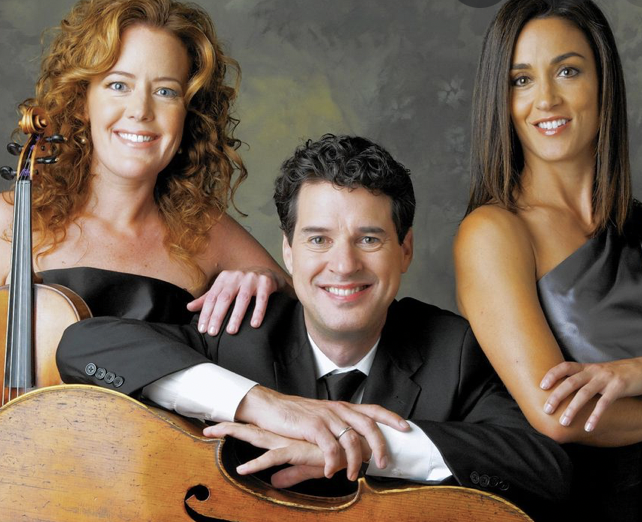|
Symphony
SRS SEASON ENDS WITH RESOUNDING TA-TA-TA-BANG
by Terry McNeill
Sunday, June 1, 2025
Symphony
YOUTHFUL VIRTUOSITY ON DISPLAY AT USO'S MAY CONCERTS
by Peter Lert
Saturday, May 17, 2025
Symphony
MYSTICAL PLANETS AND LIVELY GERSHWIN ORTIZ AT FINAL SRS CONCERT
by Peter Lert
Sunday, May 4, 2025
Symphony
VSO'S CONCERT MUSIC OF TIME, MUSIC OF PLACE
by Peter Lert
Sunday, April 27, 2025
Choral and Vocal
VOCAL ELEGANCE AND FIRE AT THE 222'S RECITAL APRIL 26
by Pamela Hicks Gailey
Saturday, April 26, 2025
CANTIAMO SONOMA SINGS AN INSPIRED GOOD FRIDAY MOZART REQUIEM CONCERT
by Pamela Hicks Gailey
Friday, April 18, 2025
DRAMATIC SHOSTAKOVICH SYMPHONY CLOSES PHILHARMONIC'S 25TH SEASON
by Terry McNeill
Sunday, April 13, 2025
LARGE COLLEGE OF MARIN AUDIENCE GREETS STOPHER ARTISTRY
by Terry McNeill
Saturday, April 5, 2025
Chamber
FRISSON DELIVERS SHIVERS OF DELIGHT
by Abby Wasserman
Sunday, March 30, 2025
OLD AND MOSTLY NEW IN SRS MARCH CONCERT IN WEILL
by Peter Lert
Saturday, March 22, 2025
|
 |
 Lincoln Piano Trio |
THE LINCOLN RETURNS WITH CLARKE'S PUNGENT TRIO
by Terry McNeill
Thursday, November 18, 2021
There were many familiar faces Nov. 18 during Music at Oakmont’s initial concert of the season, but perhaps the most necessary were the three musicians of the Lincoln Piano Trio, the Chicago-based group that has performed often in Oakmont since 2006.
A smaller than unusual audience in Berger Auditorium warmly greeted cellist David Cunliff’s introductory remarks from the stage, and settled into listening to Bloch’s short Three Nocturnes for Piano Trio. These are lovely and often muted short atmospheric works, with the Lincoln’s admirable ability to play really softly. The Tempestoso featured sweeping arpeggios from pianist Marta Aznavoorian, the music veering back to a romantic theme that had majesty in this performance. It also had a quiet ending. Low-register string playing in the bucolic Andante Quieto was captivating.
Wheaton College composer Shawn Okpebholo’s “Aqua,” a section of his three-part City Beautiful, was also played atmospherically, but with the infusion of jazz, off-beat accents and the cello line echoing the sound of violinist Desirée Ruhstrat. There was a pretty tune for the piano part.
Turina’s Second Piano Trio (Op. 76, in B Minor) concluded the first half, and the Lincoln demonstrated fine ensemble in a work that was played sounding more French than from the composer’s native Spain. There were driving rhythms in the opening Lento-Allegro Molto and a hint of Fauré’s style. The middle movement was played playfully with fast passage work from Ms. Ruhstrat, and the finale was played full of sonic contrasts and a colorful piano tone. There were many tempo changes, but the music made no bow to contemporary compositional trends at its 1933 birth. A fetching performance of just under 14 minutes.
The afternoon’s highlight was Rebecca Clarke’s Piano Trio, a work now often played and here generously offered by the Trio. Some music in the opening Moderato was at times plaintive and even pleading, but with ample passion. The ending faded to lovely pizzicato. The Andante Molto was played with quaint lyricism and featured Mr. Cunliff’s double stops and another bantamweight ending.
The finale had an exciting reading with the piano line jumping about, slashing cello bowing, string slides in both the cello and violin, glissandos in the piano line, and splendid rumblings in the piano’s bottom register. Phrases were longer here, and at the 24-minute ending the music simply erupted in splendor.
Praise needs to go to Ms. Aznavoorian’s piano sound, perhaps an unfair comparison with the same instrument in an Oakmont jazz concert three weeks ago (which I enjoyed). The pianist then simply hammered out notes, loud and soft, fast and slow, but Ms. Aznavoorian made the instrument sing, the top end sparkling and the bass thundering.
Piazzolla’s Otoño Porteño from his popular Four Seasons of Buenos Aires closed the concert in high style, the first big theme given to Mr. Cunliff’s wide vibrato and fast rhythmic phrasing unique to the composer. The playing again had instrumental slides and the Lincoln changed tone color for effect, making the sound at times dry. Speeding to a Presto ending, this exciting performance generated a standing ovation.
An encore? Sure, and it was another Lincoln surprise – Londonderry Air, the Irish Air that became widely known in “Danny Boy” from 1913. It was a winsome and nostalgic performance with the audience seemingly holding its breath.
Music at Oakmont Founder Robert Hayden was in the audience, and was warmly acknowledged for his soon to be celebrated 100th birthday. MOA Artistic Director Rosemary Waller announced the Dec. 9 concert that will feature cellist Nicholas Canellakis and pianist Michael Brown.
|

